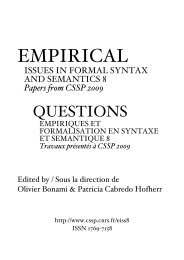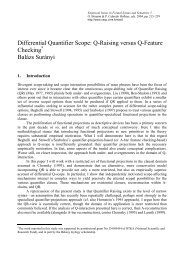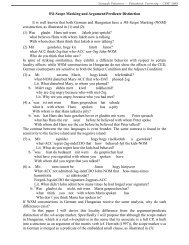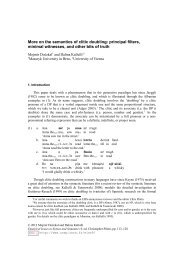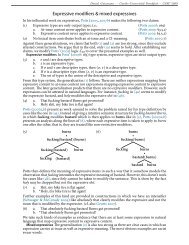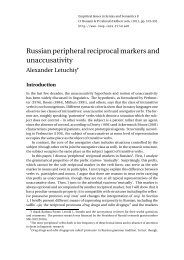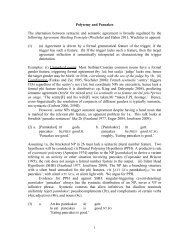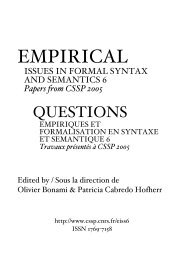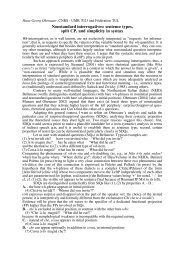Empirical Issues in Syntax and Semantics 9 (EISS 9 ... - CSSP - CNRS
Empirical Issues in Syntax and Semantics 9 (EISS 9 ... - CSSP - CNRS
Empirical Issues in Syntax and Semantics 9 (EISS 9 ... - CSSP - CNRS
You also want an ePaper? Increase the reach of your titles
YUMPU automatically turns print PDFs into web optimized ePapers that Google loves.
force is stronger than that of the non-modalized (26b) (although the latter also conta<strong>in</strong>s the<br />
justification of the ma<strong>in</strong> clause), <strong>and</strong> the two sentences cannot be used <strong>in</strong> the same contexts. We<br />
conclude that an essential aspect of the use of the subjunctive is this <strong>in</strong>teractive <strong>and</strong> deductive<br />
facet, even if, <strong>in</strong> many cases, the use of the mood can be presented <strong>in</strong> a simplified way (as a<br />
straightforward semantic matter).<br />
Accord<strong>in</strong>gly, while the condition on the subjunctive is usually written <strong>in</strong> semantic terms,<br />
we propose to formulate it as a pragmatic condition as <strong>in</strong> (27).<br />
(27) Condition on the motivation of the subjunctive mood<br />
The subjunctive is motivated when the speaker takes <strong>in</strong>to account the fact that there may<br />
exist an agent who believes that non-p is possible.<br />
Thus, <strong>in</strong> our analysis, it is not only the condition on the <strong>in</strong>dicative which is pragmatic <strong>in</strong><br />
that it appeals to an agent’s commitment, but also the condition on the subjunctive which relies<br />
on a speaker be<strong>in</strong>g <strong>in</strong> an argumentative environment. In this, our proposal differs from all the<br />
exist<strong>in</strong>g ones.<br />
3.3. The distribution of the two moods <strong>in</strong> French<br />
It is not enough to state the semantico-pragmatic conditions which motivate the occurrence<br />
of the moods. One of the properties of these two conditions is precisely that they are not <strong>in</strong><br />
complementary distribution: there are cases where both conditions are met. It is precisely what<br />
characterizes the class of evaluatives, at least the factive ones, as suggested <strong>in</strong> Farkas (1992).<br />
In (28) (= (15)) the speaker is committed to the truth of the proposition ‘One does not have to<br />
pay to visit this part of town’ (condition (20) is met), while at the same time s/he judges that<br />
one would expect th<strong>in</strong>gs to be different, <strong>and</strong> by this evaluation <strong>in</strong>troduces non-p (‘one must pay<br />
to visit this part of town’) (condition (27) is met).<br />
(28) C’est drôle par ici, c’est tout plus gr<strong>and</strong> que vers chez nous, c’est un quartier plus riche,<br />
c’est même bizarre que ça ne soit SUBJ pas payant, tellement c’est joli … (P. Cauv<strong>in</strong>,<br />
Monsieur Papa, 1976, p. 170, Frantext)<br />
It is funny around here, everyth<strong>in</strong>g is bigger than around our place, it’s a richer part of<br />
town, it’s even bizarre that we don’t have to pay, it’s so pretty …<br />
If the complement clause of these predicates meets both conditions, we would expect that they<br />
are compatible with both moods. Indeed, this is what we f<strong>in</strong>d <strong>in</strong> Romanian, as shown <strong>in</strong> (29). 2<br />
S<strong>in</strong>ce they require the subjunctive <strong>in</strong> the complement clause <strong>in</strong> (st<strong>and</strong>ard) French, it is<br />
necessary to add a rule for the distribution of the two moods. The motivation for the two moods<br />
can be the same <strong>in</strong> the two languages, but the rule which distributes them is different.<br />
(29) Ion se bucură {că vii IND / să vii SUBJ } la petrecere.<br />
Ion is happy that you come to the party<br />
(30) Pr<strong>in</strong>ciple of distribution of the moods <strong>in</strong> French (when the mood is motivated)<br />
The complement clause is<br />
(a) <strong>in</strong> the <strong>in</strong>dicative if condition (20) is met <strong>and</strong> not condition (27);<br />
(b) <strong>in</strong> the subjunctive if condition (27) is met (which allows for both (20) <strong>and</strong> (27) be<strong>in</strong>g<br />
met).<br />
2<br />
Thanks to G. Bîlbîie <strong>and</strong> A. Mardale for po<strong>in</strong>t<strong>in</strong>g out this fact to me.<br />
138



